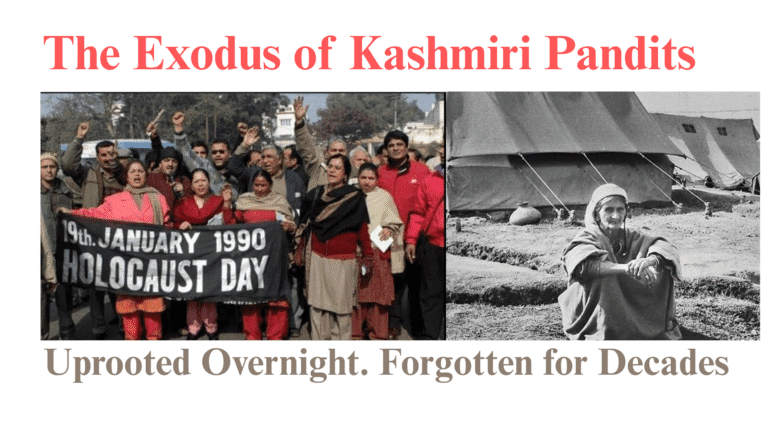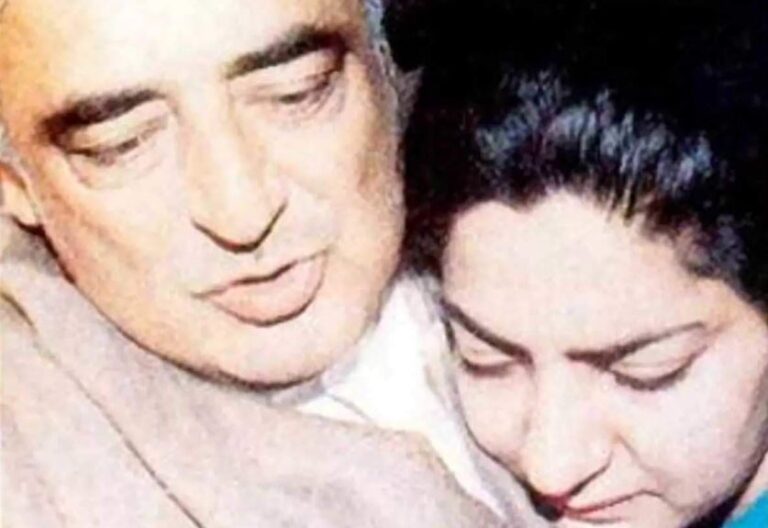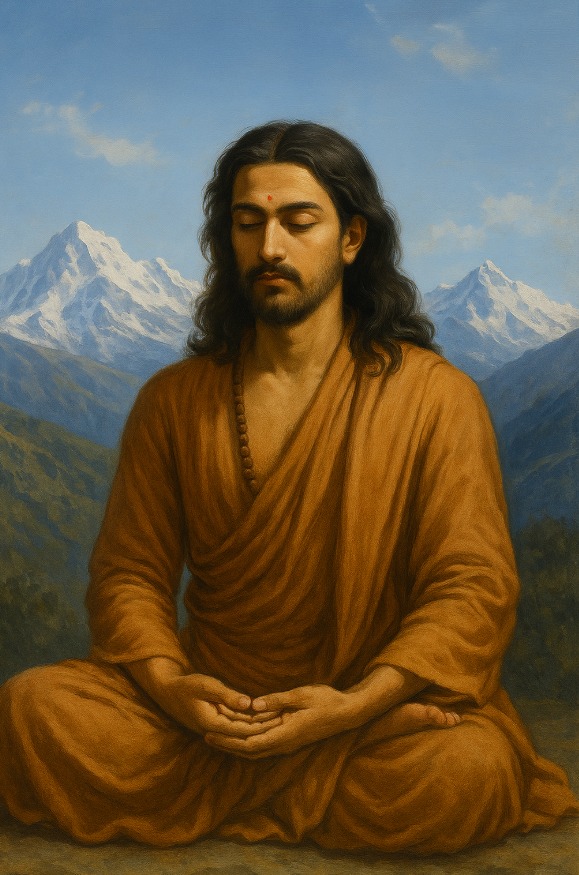Jo shakhs ho zinda to phir kya khaak marta hai
Hunar ke saath insaan amar ho jaata hai
These words by Josh Malihabadi resonate profoundly with the life and legacy of Sarvanand Kaul Premi, a luminary whose diverse talents and unwavering spirit continue to inspire long after his untimely demise alongside his younger son, Virender Kaul, at the hands of radical jihadis.
Table of Content
- Introduction: The Legacy of Sarvanand Kaul Premi
- Birth and Early Life
- Family Background and Spiritual Influences
- The Freedom Struggle: Premi’s Involvement in India’s Independence Movement
- Literary Journey
- Encounter with Mahjoor and the Birth of a Poet
- Social Activism and Communal Harmony
- The 1986 Kashmir Riots and Premi’s Role
- The Tragic End: The Brutal Killing of Sarvanand Kaul Premi and His Son
- Premi’s Multifaceted Personality and Literary Contributions
- Awards and Recognition
- Notable Works and Translations
- Controversy: Inclusion of Premi’s Works in Educational Curriculum
- The Fight for Justice: Rajinder Kaul’s Ongoing Struggle
- Engagement with National and State Human Rights Commissions
- Challenges in Preserving Premi’s Literary Legacy
- Conclusion: The Enduring Impact of Sarvanand Kaul Premi
Birth and Early life
Sarvanand Kaul Premi was born on November 2, 1924, during the holy month of Kartik, on Krishna Paksha Navami in Soaf Shali near Kokernag in Anantnag District. He was the second of five siblings born to Gopinath Kaul. His forefathers had lived in Rainawari, Srinagar, before migrating to Butagund, a village near Bijbehara, and finally settling in Soaf Shali, Kokernag. Sarvanand Kaul’s mother passed away when he was only four years old, after which he was cared for by his aunt Gunwati.
Family Background and Spiritual Influences
Sarvanand Kaul Premi’s father, Gopi Nath, was a deeply religious man who dedicated much of his time to devotional practices, including worshipping and studying sacred Hindu scriptures. The family home was frequently visited by sadhus (holy men), creating an atmosphere steeped in spirituality and learning. This environment had a profound impact on young Sarvanand.
As the saying goes, “Jaisa Sang, Waisa Rang” (one is influenced by the company one keeps), and Sarvanand was no exception. He was deeply influenced by the spiritual and intellectual atmosphere of his childhood home. Sarvanand came to regard his father, Gopi Nath, not only as a parent but also as a mentor and spiritual guide. From his father, he inherited a deep appreciation for religious texts and spiritual knowledge, which would shape his own path as a scholar and writer.
This early exposure to religious studies and spiritual seekers laid the foundation for Sarvanand’s future as a multifaceted individual, combining spirituality with scholarship and social engagement.

The Freedom Struggle: Premi’s Involvement in India’s Independence Movement
After completing his graduation, Sarvanand Kaul Premi joined Khader Bhandar( Gandhi Ashram) for a job. Khadi was adopted in 1920 as a political weapon in the Swadeshi movement by Mahatma Gandhi. It was here that he encountered other freedom fighters and had the privilege of meeting Mahatma Gandhi himself, who was deeply impressed by the young man’s dedication and commitment to the cause of independence. Inspired by Gandhi’s principles of non-violence and civil disobedience, Sarvanand Kaul Premi became actively involved in organizing local protests.
His involvement with Khader Bhandar not only strengthened his resolve but also expanded his network within the freedom struggle movement. Sarvanand Kaul Premi’s efforts were instrumental in mobilizing support from various sections of society, including students and workers, towards the goal of Indian independence. As his reputation grew, Sarvanand Kaul Premi became a target of British repression. Undeterred, he continued to lead protests and faced arrest on multiple occasions
Encounter with Mahjoor and the Birth of a Poet
Sarvanand Kaul Premi wrote a lot during this time, but he was unsure about his poetry and kept it hidden. Someone close to him convinced him to share his work with the well-known poet Mahjoor. Mahjoor, whose full name was Ghulam Ahmad Mahjoor, was a renowned Kashmiri poet known for his contributions to Kashmiri literature. The meeting between Premi and Mahjoor proved to be pivotal in Sarvanand Kau’s Premi’s career.
This meeting initiated what is known as the Guru Shishya Parampara, a traditional Indian concept of mentorship where knowledge, skills, and wisdom are passed from a guru (teacher) to a shishya (disciple). Mahjoor’s experience and insight allowed him to recognize Premi’s talent immediately. He encouraged Premi to continue writing. This encouragement led to Premi’s famous poem, “Roodha Jehri.” (Rain spell).
Social Activism and Communal Harmony
Sarvanand Kaul Premi’s commitment to social reform manifested in various ways, including his efforts to support the marriage of orphaned Muslim girls, demonstrating his cross-community engagement. His work unfolded against a backdrop of escalating political instability in Jammu and Kashmir.
In 1986, a significant political transition occurred when Ghulam Mohammad Shah supplanted Farooq Abdullah in what was essentially a coup. This shift led to increased volatility in the region’s governance. In an attempt to solidify his position, Shah’s administration sought legitimacy through alignment with Islamist factions, inadvertently amplifying their political influence.
A pivotal moment arose when Shah proposed the construction of a mosque within the confines of an ancient Hindu temple in Jammu’s New Civil Secretariat area, ostensibly to provide Muslim employees a space for prayer. This decision catalyzed widespread protests among Jammu’s Hindu population, ultimately resulting in inter-communal clashes.
Upon returning to the Kashmir Valley, Shah employed inflammatory rhetoric, suggesting that Islam was under threat. This narrative exacerbated tensions, culminating in the 1986 Kashmir riots. During this period, Kashmiri Hindus became targets of violence, with numerous temples desecrated or destroyed, particularly in Ananatnag.The unrest led to the looting of Kashmiri Hindu properties, instigating a wave of panic among the minority community and precipitating their exodus from the region.
The interreligious tensions between the Hindu and Muslim communities manifested in mutual economic boycotts during significant religious observances such as Maha Shivratri. While Hindus abstained from purchasing meat, Muslims reciprocated by withholding essential commodities from Hindu consumers. In this context of communal discord, Sarvanand Kaul Ji emerged as a mediator, attempting to bridge the divide between the antagonistic groups and promote interfaith harmony.
He appealed to members of both communities to cease hostilities, emphasizing the historical fraternal bonds between local Muslims and Hindus. Initially, his efforts towards fostering communal amity yielded some positive outcomes. However, the tragic irony of his endeavors became evident in 1990 when he fell victim to the very sectarian violence he had strived to mitigate. This unfortunate event underscored the intricate and volatile nature of the region’s communal dynamics, highlighting the challenges inherent in maintaining peaceful coexistence in areas of deep-rooted religious tensions.
The Tragic End: The Brutal Killing of Sarvanand Kaul Premi and His Son
On April 28, 1990, a group of armed extremists perpetrated a heinous act against the family of Sarvanand Kaul Premi in Kashmir. The assailants strategically disabled the local power supply before infiltrating Premi’s residence, timing their intrusion to coincide with the family’s post-dinner retirement.
Under the pretense of seeking someone Ghulam Rasool address, the intruders gained entry. They systematically held the family members into a single room, proceeding to seize valuables including gold, jewellery, Pashmina Shawls, and their clothes, which they have purchased for the wedding of his close Family relatives.Their pillage extended to forcibly removing personal adornments from family members too. Nothing was left behind.
The adjacent library, Sarvanand Ji’s adjacent house for reading and writing, was not spared. The assailants vandalized this space, absconding with significant literary works and manuscripts that Premi had been developing.
Following the comprehensive looting, the perpetrators employed deception, claiming a need to escort Sarvanand Kaul Premi to meet their Commander with assurances of his safe return. Virender Kaul, Premi’s son, insisted on accompanying his father, sensing potential danger. The assailants’ agreed to this request was an ominous portent.
In the aftermath, after days of their kidnapping, local law police officials approached the family with the ostensible intent of preparing them for the grim reality. The police first suggested that the family should eat something. This was their way of gently preparing the family for the terrible news they were about to hear. Then, the police told the family that they had found Sarvanand and Virender. Sadly, both had been killed. Their bodies were found hanging from a tree. They had been badly hurt – their arms and legs were broken, and their eyes had been damaged. This showed that the kidnappers had been extremely cruel before killing them.
The tragedy was further compounded by the domestic circumstances of Virender Kaul. His untimely demise left in its wake a young widow and an infant child, merely eighteen months of age. This familial fracture exemplifies the far-reaching consequences of such acts of violence, extending beyond the immediate victims to impact subsequent generations.
Compounding the tragedy, Sarvanand Kaul’s youngest son, Ravinder Kaul, was unable to attend his father’s cremation due to the risks associated with his position at All India Radio’s news section in New Delhi. During this period, employment with state-run media outlets like All India Radio or Doordarshan was viewed with extreme hostility by radical extremists. Such employees were often branded as agents of the Indian state, making them prime targets for violence. The gravity of this threat is exemplified by the fate of Lassa Kaul, who was murdered solely for his association with Doordarshan. This grim reality underscores the perilous circumstances faced by media professionals in the region, caught in the crosshairs of political and ideological strife.
This was not the only case where bodies were mutliated before being Killed. Samething same happened with Girija Tikoo , Sarla Bhat and many others.

Premi’s Multifaceted Personality and Literary Contributions . Notable Works and Translations
Sarvanand Kaul Premi, revered as Shaheed (martyr) in Kashmiri Pandit community, stands as a paragon of intellectual versatility and cultural synthesis in 20th century Kashmir. His multifaceted persona encompassed roles as diverse as they were profound: poet, author, thinker, scholar, translator, socio-political activist, and journalist. Premi’s scholarly acumen was particularly evident in his linguistic prowess. His command over multiple languages allowed him to bridge cultural divides and bring literary masterpieces to new audiences. Perhaps his most remarkable achievement in this realm was his translation of Rabindranath Tagore’s “Gitanjali” into Kashmiri. This work not only demonstrated Premi’s technical skill as a translator but also his deep understanding of both Bengali and Kashmiri cultural nuances, enabling him to convey both the literal meaning and the spiritual essence of Tagore’s seminal work.
His other great works was the translation of Bhagvad Gita and Ramayana into Kashmiri and Urdu. The breadth of Sarvanand Kaul Premi’s contributions to Kashmiri culture and literature is difficult to overstate. His life’s work serves as a bridge between languages, cultures, and belief systems, exemplifying the rich, syncretic tradition of Kashmir. In his roles as writer, translator, and public intellectual, Premi not only preserved but also dynamically interpreted and expanded the cultural heritage of his homeland.
His notable works are Kalami Premi, Bhakti Kusum, Biography of Mirza Kak, works on Mathura Devi, Rupa Bhawani , Paanchader, and many dozen books
Awards and Recognition

The Delhi Metro has commemorated the legacy of a celebrated Kashmiri poet and martyr by installing a plaque at Barakhamba Metro Station. This tribute acknowledges his significant contributions to social harmony, cultural preservation, and communal unity.
Throughout his life and posthumously, the poet received numerous accolades for his work:
- 1997: Posthumously honored with a gold medal by the Jammu & Kashmir Government
- 1997: Awarded a medal and memento by Delhi Pradesh BJP during India’s 50th independence anniversary celebrations
- 2000: Bestowed the Shree Bhatt Puruskar by J&K Vichar Manch, New Delhi
- 2001 (September 5): Presented with the Sarvanand Kaul Premi Gold Medal by the Jammu & Kashmir Government at Raj Bhawan, Srinagar
- 2006: Received the Sharda Puruskar Saman from Sanjeevani Sharda Kendra, Jammu
- 2017: Honoured with the inaugural Alakh Saman by Shri Alakh Sahiba Trust, Jammu
These awards recognize the lasting influence the poet has had on Kashmiri culture. His work also aimed to bring different communities together. In his hometown of Soaf Shali, a higher Secondary school was even named after him in his honour.

Hue and Cry in Jammu Kashmir Controversy: Inclusion of Premi’s Works in Educational Libraries
In 2018, a significant initiative was proposed in Jammu and Kashmir to incorporate religious texts, including translations of the Bhagavad Gita and the Kashmiri Ramayana by Sarvanand Kaul Premi, into various educational and cultural departments. This decision was initially approved in a meeting chaired by BB Vyas, an advisor to Governor Satpal Malik, on October 4, 2018 was taken back on 18th October, 2018 meeting the same fate as allocating Land to Amarnath Shrine board
The Fight for Justice: Rajinder Kaul’s Ongoing Struggle
Faced with immense personal adversity, Rajinder Kaul , the elder son of Sarvanand Kaul has embarked on a mission to preserve and promote his father Sarvanand Kaul Premi’s invaluable literary contributions. Surrounded by his father’s manuscripts and personal belongings in Delhi, Rajinder tirelessly works to republish Premi’s works. This includes translations of Russian folktales and the poetry collection ‘Bhakti-Pushp’ into other languages. However, he faces significant challenges like a diminishing readership for Kashmiri literature and a lack of recognition as well as support from governmental bodies and institutions.
National and State Human Rights Commissions
In 1994, shortly after the establishment of the National Human Rights Commission (NHRC) by the Government of India, Kaul took a significant step. He penned a four-page handwritten letter to the NHRC, detailing the atrocities, genocide, human rights violations, and ethnic cleansing experienced by the Kashmiri Pandit community. This simple act of reaching out to the newly formed commission would set in motion a series of events that continue to resonate today.
The NHRC’s response was swift and unprecedented. Taking suo moto cognizance of Kaul’s petition, the commission granted him an audience with its full panel, including Justice Ranga Nath Mishra, Justice S.S. Kang, and Justice B.B. Fatima. This hearing, held in June 1994, focused on the denial, deprivation, and discrimination suffered by the exiled community. Kaul’s appeal was not just for recognition of their suffering but also for preventive, punitive, and restorative measures.
As other organizations like All India Kashmiri Samaj and Panun Kashmir Movement joined the cause with their petitions, Kaul’s efforts became part of a larger movement. The NHRC began hearing these petitions collectively, culminating in a verdict in 1999 that specifically appreciated Kaul’s arguments on genocide.
The struggle for justice, however, was far from over. In 2008, the NHRC transferred Kaul’s family case to the State Human Rights Commission (SHRC) of Jammu and Kashmir, urging a speedy disposal of the case. This transfer came in light of the state government’s failure to address the grievances of Kaul’s family, described as “patriotic and front-line terrorism victims.”
After four years of prolonged hearings, the SHRC delivered a landmark double bench verdict in 2012 – the first of its kind in a Kashmiri Pandit case. The judgment directed the state government to address the grievances “Sooner The Better.” This verdict seemed to promise a turning point in the long-standing issue.
Despite this clear directive, the implementation of the SHRC’s recommendations has been frustratingly slow. Multiple high-level meetings have been held, chaired by various senior officials including the Principal Secretary to the Chief Minister, the Financial Commissioner, the Chief Secretary, and even the Governor’s advisor. Yet, as of Kaul’s account, these meetings have not translated into concrete action.
This continued inaction, in Kaul’s view, represents not just a disregard for the SHRC’s authority but also an insult to the sacrifices made by families like his who have suffered immensely at the hands of Terrorists. The lack of progress stands in stark contrast to the urgency of the situation and the clear directives issued by various bodies over the years.
Rajinder Kaul’s journey from writing a heartfelt letter to navigating the complex corridors of bureaucracy and human rights commissions illustrates the challenges faced by those seeking justice for displaced communities. His persistent advocacy, spanning nearly three decades, serves as a poignant reminder of the ongoing struggles of the Kashmiri Pandit community and the often-arduous path to justice in cases of forced exile and human rights violations.
As this situation continues to evolve, Kaul’s efforts remain a crucial part of the larger narrative of the Kashmiri Pandit exodus, highlighting the need for continued attention and action on this critical issue of human rights and social justice.
Conclusion: The Enduring Impact of Sarvanand Kaul Premi
As we reflect on Sarvanand Kaul Premi’s life and contributions, we are reminded of the vital role that intellectuals, artists, and activists play in shaping society and fostering understanding across divides. His story serves as an inspiration for future generations to pursue knowledge, embrace diversity, and work tirelessly for the betterment of their communities. In an era where cultural tensions and social divisions continue to challenge our societies, the life and work of Sarvanand Kaul Premi offer valuable lessons in resilience, creativity, and the pursuit of harmony. His legacy lives on not only in his written works but in the ongoing efforts to build a more inclusive and understanding world – a fitting tribute to a man who dedicated his life to bridging cultures and fostering peace. To sum up
Chman mein jis ne khushboo ka dia tha nazarana,
Taasub ki aag ne us gul ko kar diya fana
The violence in Kashmir is merely a glimpse into the larger tragedy. Intolerance has fuelled horrific attacks by extremists, tearing apart the social fabric of the valley and claiming lives from both Hindu and Muslim communities. If you have a firsthand account of these events, I’m ready to share your story uncensored. Please reach out to me at author@rohittikoo.com and let me amplify your voice.
For detailed information on the genocide of Kashmiri Pandits Read the book Kashmiri Pandits: A tale of solitude and Survival






